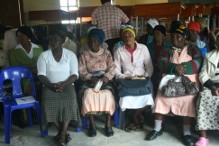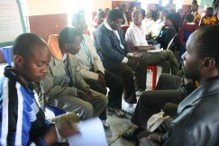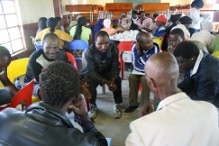
The community gathers round to talk about the drivers of HIV/AIDS
December 13, 2010 – The Nelson Mandela Foundation completed the third and final year of the HIV/AIDS community conversations programme with a series of World AIDS Day dialogues. This year the South African theme for World AIDS Day was “I am responsible. We are responsible. South Africa is taking responsibility,” and the Foundation commemorated the day by hosting community conversations in all nine provinces.
As part of national commemorations, the Foundation also partnered with the Department of Social Development to host two sets of dialogues in Nquthu, Kwazulu-Natal – one in eMasotsheni and the other in Kwavulamehlo – prior to a ministerial dialogue around the National Strategic Plan (NSP) for HIV/AIDS, TB and STIs for 2012 to 2016.
National and provincial social development representatives and those from uMzinyathi Municipality, local youth groups, support groups and non-governmental organisations, as well as social workers and community development practitioners, were in attendance at a briefing session prior to the dialogues. Regional Facilitator Lesley Nkosi introduced stakeholders to the Community Capacity Enhancement (CCE) methodology, while also making use of the opportunity to gain a better understanding of sociocultural dynamics within the Nquthu communities.
The eMasotsheni dialogue was well-attended, with men, women and youth engaging in conversation on how South Africans can take responsibility for responding to the epidemic and its impact.
Using the storytelling tool, the community identified misconceptions surrounding HIV/AIDS, particularly the belief that raping a virgin “cures” HIV, suggesting that incest, migration and power relations within families contributed significantly to the spread of the virus. It was also felt that a sense of community and ubuntu (“caring for one another”) had been lost, leading to increased stigmatisation of those who were HIV positive. The community also expressed their dissatisfaction with nurses at the local clinic, who were known to disclose the HIV status of patients publicly. Another concern articulated was the lack of running water in the community, compromising people’s ability to take anti-retrovirals.
A follow-up dialogue was held in eMasotsheni, during which the community reflected on how their behaviour encourages the spread of HIV. Six community members were then chosen to represent the community and their concerns at the ministerial dialogue on December 2, 2010.
The Kwavulamehlo dialogue wasn’t as well-attended due to poor social mobilisation; very few of those who did arrive were from the community. As a result, the outcomes cannot be considered an accurate reflection of the community’s concerns.
That being said, some of the main drivers of the epidemic identified were substance abuse, prostitution and incest. Following an exercise in which community members reflected on who and what they had lost as a result of HIV/AIDS, seven people disclosed their status. Following this disclosure, all seven received professional counselling.
The ministerial dialogue in preparation for the drafting of the new NSP was held the at Princess Mkabayi Children’s Home on December 2. Social Development Minister Bathabile Dlamini as well as KwaZulu-Natal Social Development MEC Meshack Radebe and other dignitaries gathered to listen to community members and engage them on issues relating to HIV/AIDS.
Community concerns and solutions were presented to the dignitaries in three priority areas: 1. the need for forums, 2. the need for increased focus on HIV counselling and testing, and 3. the need for integrated resources for children and communities.
In terms of community forums, emphasis was placed on encouraging strong family and community value systems, establishing support groups for men and those living with HIV, and offering a integrated approach to HIV counselling and testing that would include family testing.
When it came to HIV counselling and testing, community members emphasised the importance of confidentiality, anti-retroviral initiation and orientation classes, and efforts to address stigma and discrimination and encourage acceptance of those who were HIV positive.
Integrated resources for children and communities were also highlighted, specifically around transport for those too ill to travel to hospitals, regular visits by doctors, the visibility of social workers in the community and at schools, the selection of care workers from local communities, access to clean water, and access to social justice, so that women and children in particular come to understand their rights.
In closing, community members argued that a paradigm shift from a top-down to a bottom-up approach to HIV/AIDS was required, saying that the CCE methodology should be adopted by community development practitioners who are then supported by district-level officials. In this way, grassroots solutions would find much-needed support within government, leading to more effective implementation.
The community dialogues in Nquthu were the first to allow community members to engage directly with senior policymakers and so influence policy at a national level, a sure sign of progress and an indication of the CCE methodology’s power in bringing about change in communities affected by HIV/AIDS.
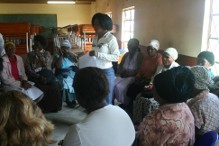
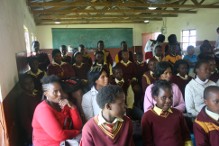
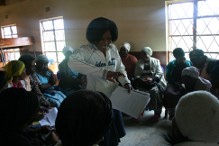 Community members engage with each other to identify the drivers of the spread of HIV/AIDS
Community members engage with each other to identify the drivers of the spread of HIV/AIDS